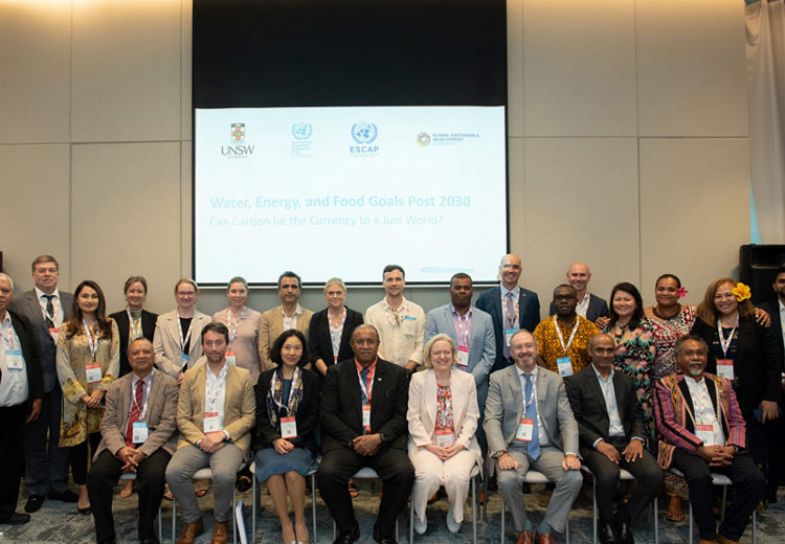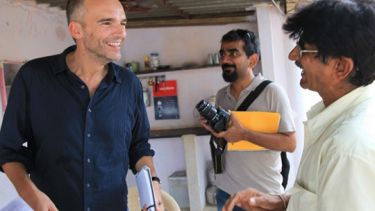The water-energy-food nexus shows the interconnected nature of the climate challenge. The solution will require a similarly interlinked approach
As the world sets its future water, energy and food goals, it must accept that these are complex and cross-sectorial. A round-table discussion at the 2024 THE Global Sustainable Development Congress brought together experts from a broad spectrum of backgrounds. The discussion was held in partnership with the University of New South Wales (UNSW) in Sydney, Australia and the United Nations (UN) Economic and Social Commission for Asia and the Pacific (ESCAP).
“One of the defining features of the UN’s Sustainable Development Goals (SDGs) is their interlinked nature,” said Lin Yang, deputy executive secretary of ESCAP. “To make substantial progress across the entire 2030 agenda for sustainable development, it’s crucial to understand and exploit these linkages.”
The water-energy-food nexus is a prime example of the interlinked challenges facing the Asia-Pacific region. “These crucial discussions speak to the importance of engaged and reciprocal partnerships and collaboration for accelerating progress in all areas of sustainability,” said Verity Firth, UNSW’s vice-president of societal impact, equity and engagement. “At UNSW, our goal is to solve the world’s problems by partnering and operating at a local, regional and national scale,” said Firth.
The participants acknowledged that more could be achieved collectively than in isolation. “Partnerships between academia and the UN can provide countries with expert upstream policy advice on development solutions,” said David McLachlan-Karr, regional director for APAC at the UN Development Coordination Office.
“We have a total land area of 18,272 sq km, spread across about 330 islands,” noted Filipe Tuisawau, minister for public works, communications, transport and meteorological services for the Government of Fiji. “We share common challenges and threats connected to climate change with other small islands and developing states. Our national development plans are hugely important here.”
Timor-Leste is displaying a similar commitment to strengthening food sovereignty, facilitating environmental regeneration and building resilient and sustainable communities. “My organisation’s approach is to work with people,” said Ego Lemos, goodwill ambassador and special envoy of the president for culture, environment and water resources at Permakultura Timor Lorosa’e. “This approach is based on engagement and collaboration in the community. We believe bottom-up, culturally appropriate solutions are critical.”
Heidi Alleway, senior aquaculture scientist at the Nature Conservancy, emphasised the importance of the food-water nexus and traditional knowledge in delivering successful outcomes. “It’s worth remembering that for thousands of years, Indigenous communities have used regenerative practices. So we lean into regenerative practices as a win-win,” Alleway said. “By respectfully complementing this Indigenous knowledge with new science and technology, regenerative practices could also be a vehicle for equality.”
Taking concerted action on sustainability issues may require confronting difficult truths, said Benno Boer, chief of the Natural Sciences Unit at the Unesco New Delhi Cluster Office. “If environmental decision-makers had professional backgrounds in [subjects such as earth science, nature conservation or water management] when dealing with environmental sustainability, they would better understand how serious the triple planetary crisis has become,” Boer said. “Human survivability should move to the top of our own and our decision-makers’ priorities.”
Looking at the potential impact of carbon goals on water, energy and food security toward 2050, Andrew Dansie, academic lead for humanitarian engineering at UNSW, reiterated the importance of regional and national responses led by traditional knowledge. Solutions that monetise carbon must empower and benefit local landholders, Dansie said. This is especially vital for Pacific Small Island Developing States (PSIDS) where water, energy and food security are particularly vulnerable due to geographical challenges.
“One of the biggest challenges faced today by PSIDS is accelerating climate finance to mitigate and adapt to the impacts of climate change,” said Armida Salsiah Alisjahbana, under-secretary-general of the UN and executive secretary of ESCAP. “There is a genuine commitment from PSIDS to reduce carbon emissions. Having carbon as a currency could be the missing reagent to catalyse this commitment,” she concluded.
The panel:
- Heidi Alleway, senior aquaculture scientist, Nature Conservancy
- Armida Salsiah Alisjahbana, under-secretary-general of the United Nations and executive secretary, UN Economic and Social Commission for Asia and the Pacific
- Benno Boer, chief of the Natural Sciences Unit, Unesco New Delhi Cluster Office
- Andrew Dansie, academic lead for humanitarian engineering, University of New South Wales Sydney
- Verity Firth, vice-president of societal impact, equity and engagement, University of New South Wales Sydney (chair)
- Ego Lemos, goodwill ambassador and special envoy of the president for culture, environment and water resources, Permakultura Timor Lorosa’e
- David McLachlan-Karr, regional director for APAC, UN Development Coordination Office
- Filipe Tuisawau, minister for public works, communications, transport and meteorological services, Government of Fiji
- Lin Yang, deputy executive secretary, UN Economic and Social Commission for Asia and the Pacific
Find out more about the University of New South Wales Sydney.










